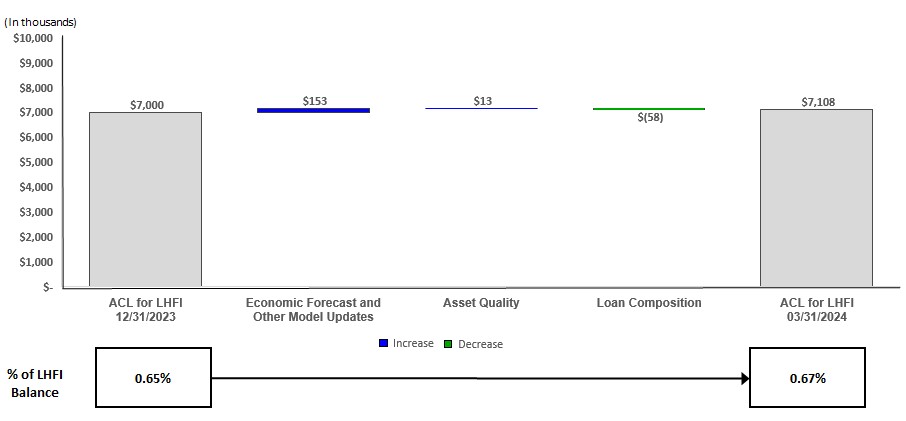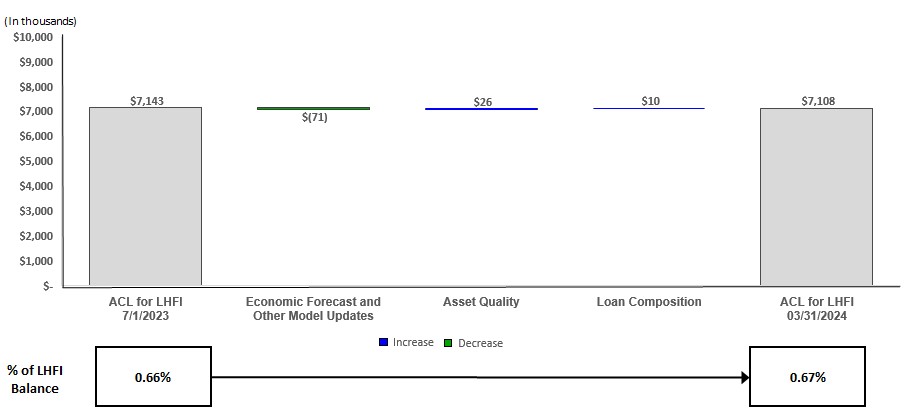On that same date, on September 28, 2023, the Board approved a new stock repurchase plan, authorizing the purchase of up to 350,353 shares of the Corporation’s outstanding common stock over a one-year period. Additionally, the Board terminated the remaining 25,428 shares available for purchase under the April 2022 plan.
During the quarter ended March 31, 2024, the Corporation purchased 50,051 shares of its common stock under the September 2023 stock repurchase plan with a weighted average cost of $13.99 per share. As of March 31, 2024, 237,592 shares or 68 percent of authorized common stock under the September 2023 plan remained available to purchase until the plan expires on September 28, 2024. For the nine months ended March 31, 2024, the Corporation purchased 148,873 shares of its common stock under the April 2022 and September 2023 stock repurchase plans, with a weighted average cost of $13.06 per share.
Note 11: Subsequent Events
On April 25, 2024, the Corporation announced that the Board of Directors declared a quarterly cash dividend of $0.14 per share. Shareholders of the Corporation’s common stock at the close of business on May 16, 2024 are entitled to receive the cash dividend. The cash dividend will be payable on June 6, 2024.
ITEM 2 – Management’s Discussion and Analysis of Financial Condition and Results of Operations
General
Provident Financial Holdings, Inc., a Delaware corporation, was organized in January 1996 for the purpose of becoming the holding company of Provident Savings Bank, F.S.B. (the “Bank") upon the Bank’s conversion from a federal mutual to a federal stock savings bank (“Conversion”). The Conversion was completed on June 27, 1996. The Corporation is regulated by the Board of Governors of the Federal Reserve System (“Federal Reserve”). At March 31, 2024, the Corporation had total assets of $1.29 billion, total deposits of $908.1 million and total stockholders’ equity of $129.5 million. The Corporation has not engaged in any significant activity other than holding the stock of the Bank. Accordingly, the information set forth in this report, including financial statements and related data, relates primarily to the Bank and its subsidiaries. As used in this report, the terms “we,” “our,” “us,” and “Corporation” refer to Provident Financial Holdings, Inc. and its consolidated subsidiaries, unless the context indicates otherwise.
The Bank, founded in 1956, is a federally chartered stock savings bank headquartered in Riverside, California. The Bank is regulated by the Office of the Comptroller of the Currency (“OCC”), its primary federal regulator, and the Federal Deposit Insurance Corporation (“FDIC”), the insurer of its deposits. The Bank’s deposits are federally insured up to applicable limits by the FDIC. The Bank has been a member of the FHLB System since 1956.
The Corporation operates in a single business segment through the Bank. The Bank’s activities include attracting deposits, offering banking services and originating and purchasing single-family, multi-family, commercial real estate, construction and, to a lesser extent, other mortgage, commercial business and consumer loans. Deposits are collected primarily from 13 banking locations located in Riverside and San Bernardino counties in California. Loans are primarily originated and purchased in California. There are various risks inherent in the Corporation’s business including, among others, the general business environment, interest rates, the California real estate market, the demand for loans, the prepayment of loans, the repurchase of loans previously sold to investors, the secondary market conditions to buy and sell loans, competitive conditions, legislative and regulatory changes, fraud and other risks.
The Corporation began paying quarterly cash dividends during the quarter ended September 30, 2002. On January 25, 2024, the Corporation’s Board of Directors declared a quarterly cash dividend of $0.14 per share for the Corporation’s shareholders of record at the close of business on February 15, 2024, which was paid on March 7, 2024. Future declarations or payments of dividends will be subject to the consideration of the Corporation’s Board of Directors, which will consider the Corporation’s financial condition, results of operations, tax considerations, capital requirements, industry standards, legal restrictions, economic conditions and other factors, including the regulatory restrictions which affect the payment of dividends by the Bank to the Corporation. Under Delaware law, dividends may be paid either out of surplus or, if there is no surplus, out of net profits for the current fiscal year and/or the preceding fiscal year in which the dividend is declared.

